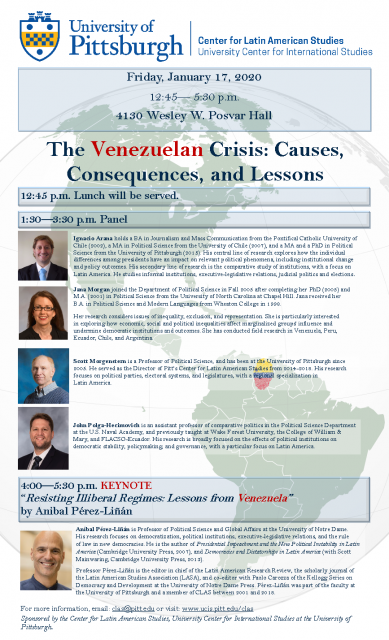
Schedule:
1:30—3:30 p.m. Panel
Moderator: Scott Morgenstern
Ignacio Arana holds a BA in Journalism and Mass Communication from the Pontifical Catholic University of Chile (2002), a MA in Political Science from the University of Chile (2007), and a MA and a PhD in Political Science from the University of Pittsburgh (2015). His central line of research explores how the individual differences among presidents have an impact on relevant political phenomena, including institutional change and policy outcomes. His secondary line of research is the comparative study of institutions, with a focus on Latin America. He studies informal institutions, executive-legislative relations, judicial politics and elections.
Jana Morgan joined the Department of Political Science in Fall 2005 after completing her PhD (2005) and M.A. (2001) in Political Science from the University of North Carolina at Chapel Hill. Jana received her B.A. in Political Science and Modern Languages from Wheaton College in 1998.
Her research considers issues of inequality, exclusion, and representation. She is particularly interested in exploring how economic, social and political inequalities affect marginalized groups' influence and undermine democratic institutions and outcomes. She has conducted field research in Venezuela, Peru, Ecuador, Chile, and Argentina.
Scott Morgenstern is a Professor of Political Science, and has been at the University of Pittsburgh since 2005. He served as the Director of Pitt's Center for Latin American Studies from 2014-2018. His research focuses on political parties, electoral systems, and legislatures, with a regional specialization in Latin America.
John Polga-Hecimovich is an assistant professor of comparative politics in the Political Science Department at the U.S. Naval Academy, and previously taught at Wake Forest University, the College of William & Mary, and FLACSO-Ecuador. His research is broadly focused on the effects of political institutions on democratic stability, policymaking, and governance, with a particular focus on Latin America.
4:00—5:30 p.m. KEYNOTE
“Resisting Illiberal Regimes: Lessons from Venezuela”
by Anibal Pérez-Liñán
Aníbal Pérez-Liñán is Professor of Political Science and Global Affairs at the University of Notre Dame. His research focuses on democratization, political institutions, executive-legislative relations, and the rule of law in new democracies. He is the author of Presidential Impeachment and the New Political Instability in Latin America (Cambridge University Press, 2007), and Democracies and Dictatorships in Latin America (with Scott Mainwaring, Cambridge University Press, 2013).
Professor Pérez-Liñán is the editor in chief of the Latin American Research Review, the scholarly journal of the Latin American Studies Association (LASA), and co-editor with Paolo Carozza of the Kellogg Series on Democracy and Development at the University of Notre Dame Press. Pérez-Liñán was part of the faculty at the University of Pittsburgh and a member of CLAS between 2001 and 2018.
For more information, email: clas@pitt.edu or visit: www.ucis.pitt.edu/clas
Sponsored by the Center for Latin American Studies, University Center for International Studies at the University of Pittsburgh.

